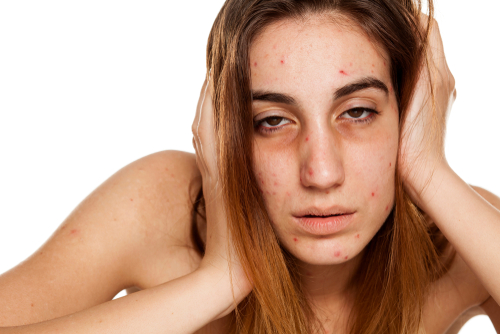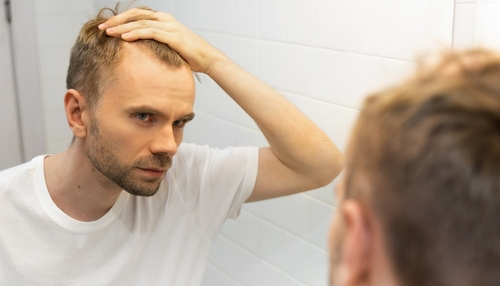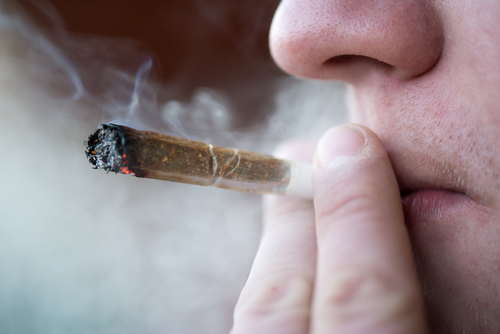If you smoke weed and have acne, chances are you’re a teenager or young adult. While earlier years of puberty involve growth spurts, body hair, and hormonal changes, one thing that tends to follow teens into their 20s is acne. 85% of people aged 12 – 24 in the U.S. have acne. And that can be upsetting and bring up insecurity while trying to become, act, and look like an adult. However, if you’re frequently smoking weed or eating edibles, you might be hindering your skin health.
This brief article covers seven reasons why smoking weed might cause acne and three reasons for hair loss. It also explores whether weed has any positive effects on skin health and whether this habit can lead to addiction.

Connect With Us Now
Reach out to us now for immediate support, or let us know the best time to contact you through our confidential callback service. Your journey to healing is just a conversation away.
Does Smoking Weed Cause Acne?
There’s no conclusive evidence smoking weed directly causes acne. The biggest reason people believe this is because most people who smoke weed are between 12 and 25 years old, with the majority being older than 18. This is also the same time when hormone levels are their highest in both men and women. This might seem like cannabis is unrelated to acne, but that’s not the case. It’s the behaviors of someone while they’re high that can indirectly worsen acne and other skin conditions.
- Hygiene: Cannabis is known to cause relaxation and euphoria, and if someone smokes frequently, they could be completely ignoring their hygiene or self-care routine. If you smoke right before bed, you might feel too tired to shower, brush your teeth, wash your face, or even change the clothes you’re wearing. And because acne is hair follicles clogged by sebum (oil) and dead skin cells, you’re not doing your skin any favor by neglecting proper hygiene. This applies to acne beyond your face, including the chest, back, shoulders, and arms.
- Munchies: Cannabis’s appetite-increasing effects lead to what most people know as the “munchies.” THC convinces’ the mind it’s hungry, even if someone has already eaten a full meal. This usually leads to constant snacking, and taste buds can feel drawn to soda, cake, chips, ice cream, cookies, and anything else with high amounts of sugar and carbohydrates.
- Sugary edibles: If you’re trying to bypass acne by eating edibles rather than smoking, it won’t do anything. Edibles that contain milk, eggs, or other animal-derived products can disrupt normal hormone levels. Sugary foods can increase insulin levels and inflammation, which can trigger acne breakouts and lead to acne-associated bacteria, such as Cutibactrium and Propionibacterium.
- Imbalanced hormones: Hormonal changes can increase the sebaceous gland’s oil production, which can mix with pore bacteria, causing acne. THC messes with the system connecting nerves and hormones, making it difficult for the endocrine system to control hormone levels, leading to more skin oil. Yet, one study found that only recent marijuana use impacts testosterone levels, and it’s not long-term.
- Sleep habits: Seeping helps regulate cortisol and other hormones in your body. However, one study found that frequently smoking marijuana affects sleep quality. Chronic users had lower total sleep times, less slow wave sleep, poor sleep efficiency, longer sleep onset time, and shorter REM latency. Other studies have found that poor sleep quality leads to more movement, and if you’re touching your face with dirty fingers, hands, bed sheets, or pillows, you’ll have more acne breakouts.
- Stress: Frequently smoking cannabis can cause the brain to become reliant on its dopamine-bosting effects. When you’re not high, the mind can feel anxious and stressed, and studies show that stress can worsen acne and hinder the skin’s ability to heal itself.
- Smoke: Smoking can cause unstable molecules called free radicals to target fatty acids in sebum, which makes it thicker and stickier. Smoking reduces vitamin E levels in the bloodstream, which prevents unstable molecules from attacking fatty acids. Smoking also reduces collagen production, which is responsible for skin elasticity and strength. Even vapes with cannabis oil can worsen acne.

Take Our Addiction Quiz For Recovery Insights
Does Smoking Weed Cause Hair Loss?
Similar to its effect on acne, smoking weed can indirectly cause hair loss. Eating unhealthy foods while high can rob the body of essential micro- and macronutrients, replacing them with excessive amounts of sodium, sugar, saturated fat, and trans-fat. Additionally, the main psychoactive chemical inside cannabis, tetrahydrocannabinol (THC), binds to receptors in the endocannabinoid system and disrupts its ability to regulate hair strength and growth. This leads to split ends, breakage, thinning, shedding, and a loss of overall hair volume.
Read more: Is Marijuana a Hallucinogen, Stimulant, or Depressant?

Does Weed Have Any Benefit For Skin?
Besides an overproduction of sebum, acne breakouts are also caused by irregular shedding of cutaneous cells (which fight germs) and inflammation. Some people have adverse reactions to topical retinoids, antibiotics, and bactericidal agents, turning to plant-derived treatments, such as CBD) due to their safety and minimal side effects. CBD (cannabidiol) is a non-psychoactive cannabinoid used to treat acne, dermatological diseases, immunological disorders, neurodegeneration, and even cancers due to its anti-inflammatory properties.
Cannabis seeds were also found to decrease inflammatory cytokines, which trigger or heighten inflammation. CBD products are available almost anywhere and in various forms, including creams and oils. Terpenes inside of cannabis, such as alpha- and beta-pinene, can also help reduce inflammation and fight against acne-causing bacteria.
Does Smoking Weed Lead To Addiction?
Chronic marijuana use can lead to a psychological marijuana use disorder. Over time, the body becomes used to its relaxing and stress-relieving effects and can struggle to produce and react to those feelings independently. This can lead to increased anxiety, depression, agitation, existential dread, and paranoia. While many people can quit smoking weed on their own, others are unable to resist cravings. In many ways, the mental and physical inability to stop using a substance despite its negative effects qualifies as an addiction.
Read more: What Is Crossfading & How It Can Lead To Polysubstance Addiction
Marijuana Addiction Treatment In Boston
If you or someone you know is struggling to stop smoking weed despite negative side effects such as acne, contact East Coast Recovery Center in Boston, MA. We treat various substance use disorders and drug addictions, including marijuana use. Even though recreational cannabis is legal in Massachusetts, if you think you need help, call us. One of our admissions agents can guide you through the intake process, program options, and how we can help you find true wellness.
Are You Covered For Treatment?
East Coast Recovery Center partners with numerous private insurance providers. Our team is committed to assisting you in quickly and effortlessly verifying your insurance coverage for treatment.










